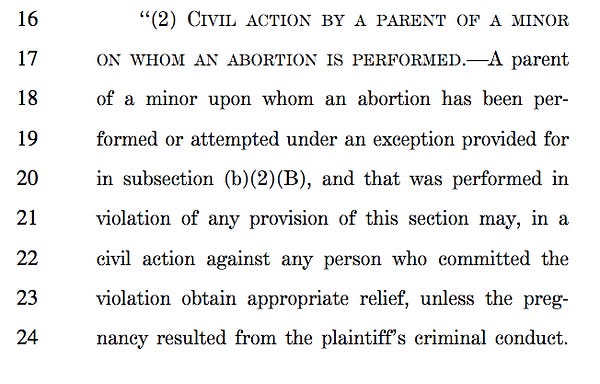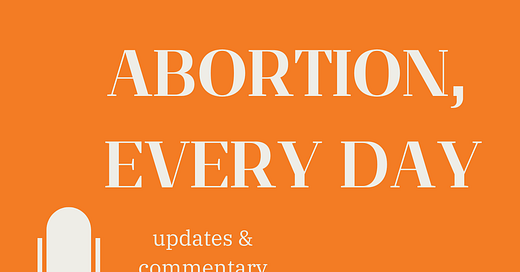I usually kick things off with what’s happening across the states. But given today’s news, we’re going to switch it up a bit.
We knew it was coming…
Sen. Lindsey Graham has introduced a federal ban on abortion after 15 weeks. This comes after Republicans told us (again and again) that they believed abortion was an issue that should be decided on by the states. We always knew was a lie, but that doesn’t make it any less infuriating.
What’s notable about the legislation is that Republicans are calling it a ban on “late” abortions. And while there is no scientific marker about what constitutes a ‘later’ abortion—it’s not a medical term—the idea that it could possibly be 15 weeks is ridiculous. The ban also has no exceptions for fetal abnormalities, most of which are detected at a 20-week ultrasound. Which Republicans, of course, are aware of. Oh, and then there’s this:


At a press conference announcing the legislation, Graham said, “There’s a narrative forming in America that the Republican Party and the pro-life movement is on a run. No, no, no, no, no, no.” He also said, incredibly, “I think the public’s with us”—which ignores every single poll that has come out showing the exact opposite. He knows, just as all conservatives do, that Americans don’t support these bans. But they can’t just come out and tell the truth: That they don’t give a shit about what Americans want.
In the states…
An Indiana judge won’t hear arguments on a lawsuit to block the state’s abortion ban until next week—which means the sweeping law will take effect on Thursday. And in Texas, the editorial board at The Houston Chronicle goes after Gov. Greg Abbott for this hardline position on abortion and insistence that rape victims can just go pick up a Plan B. (What an asshole.)
West Virginia Republicans are meeting today in a special session to try to ban abortion in the state. (For some recent history on what happened in the state with the ban, click here.) Activists have convened outside the Senate Chamber:

And if you need a reminder about what the Republicans in West Virginia look like, this photo says it all:
This is disappointing: Even though Ohio voters support abortion rights—75% cited abortion as a deciding factor in their 2022 votes—Republican Gov. Mike DeWine still has a significant lead over his opponent, Democrat Nan Whaley.
In Pennsylvania, the state Supreme Court turned down a request from Gov. Tom Wolf to hear his challenge of Republican legislation that, among other things, would amend the state constitution to say there’s no right to abortion. Also in Pennsylvania, you already know that Republican gubernatorial candidate Doug Mastriano has been trying to play down his extreme anti-abortion views. But now he’s trying a different strategy to connect with women voters: Mastriano is enlisting his wife’s help on the campaign trail (something lots of Republicans are doing recently) and claiming Democrats are the ones who don’t care about women. Specifically, he’s attacking them over the right of trans students to participate in sports—saying he’s the real feminist on the issue: “There they are, defending male domination of female sports.”
This is just one of the many reasons caring about abortion rights means caring about trans rights—the same people who would stop us from making decisions about our own body want to curtail the rights of trans people. In fact, Vice President Kamala Harris made this point yesterday at a meeting with abortion rights leaders:
“I also want to mention that it is certainly, we think, not by accident, but probably by design that we are seeing from some of the same sources attacks on women’s health rights, voting rights, LGBTQ rights. And so we stand here in full acknowledgement of what has taken place in our country.”
In Kentucky, a childhood survivor of rape writes about what the state ban is really doing: forcing children to have babies. As a reminder, dozens of children in the state, including two 9 year-old girls, had abortions in Kentucky in the last two years. Those children would now be forced to carry those pregnancies to term.
I’ve mentioned before that pro-choicers in South Dakota have started a campaign to get abortion on the ballot in 2024 via a proposal to amend the state constitution. Well, the move to do so now has formal opposition: A group calling itself the Life Defense Fund intends to oppose the constitutional amendment—and try to stop the campaign from gathering enough signatures to get it on the ballot. In short: They don’t want to give voters the opportunity to make their voices heard on abortion. (Speaking of South Dakota, now that North Dakota lost its only abortion clinic, it’s all Dakotans who will suffer.)
A new poll out of Georgia shows that Latinos in the state report abortion as a top issue for them as November closes in. This is the first time that abortion ranks as one of the top five issues that Latino voters in the state care about: 74% think abortion should be legal, regardless of their personal beliefs on the issue.
Back in June, Wisconsin attorney general Josh Kaul filed a lawsuit to block the state’s 173 year-old trigger ban from going into effect. In response, Republicans asked a county court to dismiss the suit. Now AG Kaul says if the conservative legislators don’t drop their challenge, he’ll sue three district attorneys instead. (The three he’d sue have jurisdiction where the state’s Planned Parenthoods are and would be responsible for prosecuting abortion cases.)
In Massachusetts, college students are pressuring their schools to do more to support abortion rights—while filling in those gaps themselves in the meantime. A student-run group at Boston College, for example, has been working to provide students with contraception (the Catholic university won’t do that themselves). And at Boston University, students got the administration to install a vending machine stocked with emergency contraception. Most importantly, the medication is being sold for $7.25; it costs around $50 at a pharmacy. Love to see this.
Some quick state hits: NPR has a segment on how Idaho’s abortion ban is impacting neighboring state, Washington; in California, a new law will protect the digital privacy of those seeking abortions; and the South Carolina House will reconvene to continue the debate on the state’s abortion ban on September 27th.
In the nation…
Democrats have released a new advertisement to run in multiple key districts around the country. Pretty effective, if you ask me:
The FDA has scheduled a meeting to discuss making a particular kind of birth control pill available over-the-counter, but questions about its affordability (and therefore how accessible it really will be) remain.
NBC News reports on the way Republicans are seeking a “reset” on abortion; Quartz looks into how employers should deal with offering benefits around abortion, including privacy concerns; and Refinery29 gets into how accurate, comprehensive sex education is more important than ever.
The Catholic Church is funding state-level abortion bans across the country, despite the fact that 56% of Catholics believe abortion should be legal in all or most cases. Charming.
And several medical organizations—including the American Medical Association (AMA) and the American Pharmacists Association (APhA)—released a statement about how state abortion bans are impacting doctors’ and pharmacists’ ability to care for patients.
The Hechinger Report, which covers inequality and innovation in education, reports on how abortion bans are impacting medical students and training for OBGYNs. This is not just about having enough well-trained abortion providers—but doctors who can care for pregnant women at all:
“The surgical technique of dilation and evacuation, for example, is used as a method of abortion in the second trimester but also to treat incomplete miscarriages by removing remaining pregnancy tissue. Missing out on abortion training, [OBGYN Dr. Eve] Espey said, means missing out on opportunities to prepare doctors to respond to miscarriages and other pregnancy complications.”
This is something I’ve written about before, but it really bears repeating: We’re about to have a generation of doctors who have not been adequately trained in how to give basic obstetric and gynecological care. The U.S. already has an awful maternal mortality rate—this is going to make it exponentially worse.
NowThis News features Executive Director of Planned Parenthood Votes, Jenny Lawson, talking about how Republicans are trying to hide their extreme anti-abortion positions:
Keep this on your radar…
New research shows that 99.1% of abortion clinic’s websites included third-party data transfers. The researchers note that “each could sell or sharing browsing data with law enforcement or civil litigants.” In layman’s terms? This is really, really bad. It means that nearly all abortion clinic websites include tracking code that allows companies to share (or sell) data to cops. The researchers recommend that all abortion clinics and providers should audit their websites to identify and get rid of those third-party trackers.
Please send tips to jessica@substack.com.
Listen to this episode with a 7-day free trial
Subscribe to Abortion, Every Day to listen to this post and get 7 days of free access to the full post archives.
















